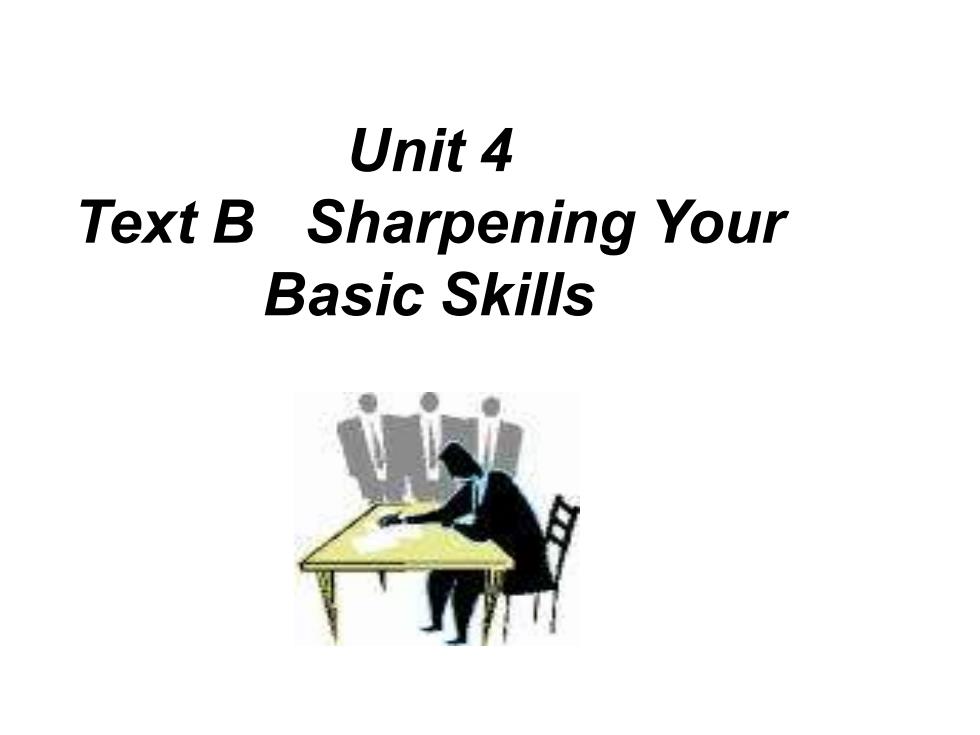
Unit 4 Text B Sharpening Your Basic Skills
Unit 4 Text B Sharpening Your Basic Skills

Warm-up ·According to the author,what does“basic skills'”mean? Have you ever employed any skills for persuasive communication? In communication,what should you put into consideration about your listener? Is there any secret in persuasion?If so, what is it? How do you make your statements appropriate for listeners and situation? How can you make your general language specific?
Warm-up • According to the author, what does “basic skills” mean? • Have you ever employed any skills for persuasive communication? • In communication, what should you put into consideration about your listener? • Is there any secret in persuasion? If so, what is it? • How do you make your statements appropriate for listeners and situation? • How can you make your general language specific?
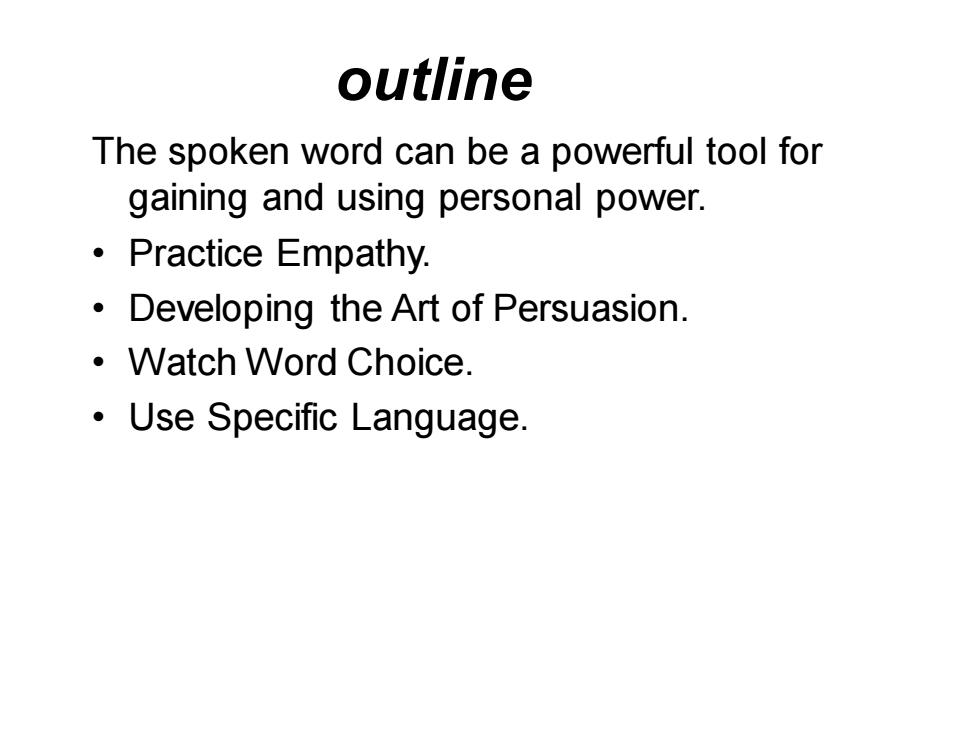
outline The spoken word can be a powerful tool for gaining and using personal power. ·Practice Empathy. Developing the Art of Persuasion. ·Vatch Word Choice. Use Specific Language
outline The spoken word can be a powerful tool for gaining and using personal power. • Practice Empathy. • Developing the Art of Persuasion. • Watch Word Choice. • Use Specific Language
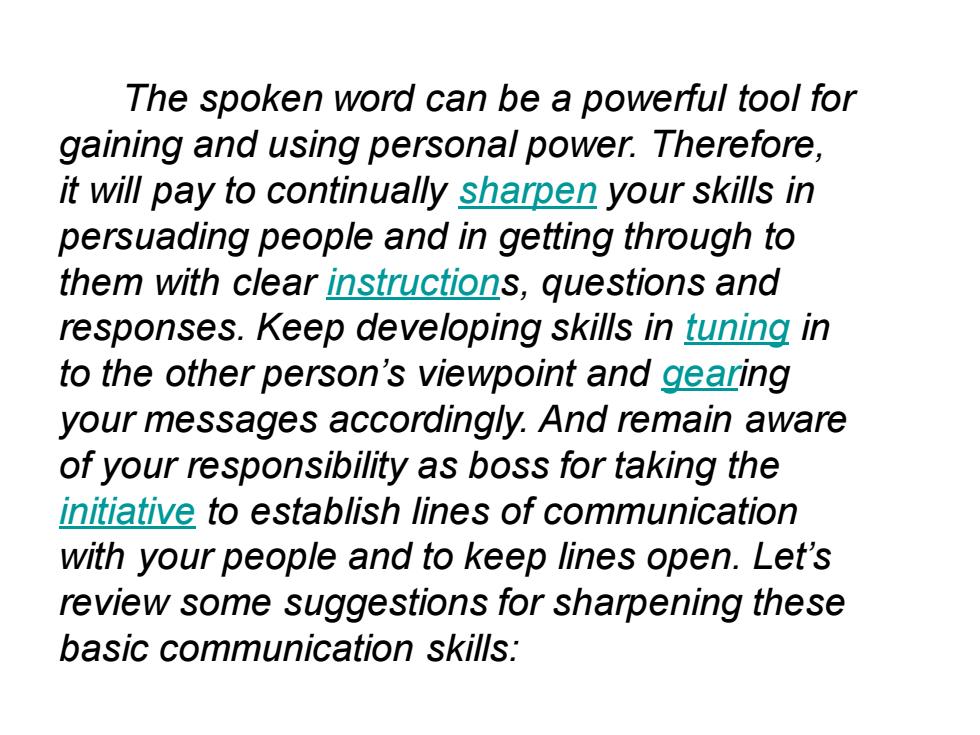
The spoken word can be a powerful tool for gaining and using personal power.Therefore, it will pay to continually sharpen your skills in persuading people and in getting through to them with clear instructions,questions and responses.Keep developing skills in tuning in to the other person's viewpoint and gearing your messages accordingly.And remain aware of your responsibility as boss for taking the initiative to establish lines of communication with your people and to keep lines open.Let's review some suggestions for sharpening these basic communication skills:
The spoken word can be a powerful tool for gaining and using personal power. Therefore, it will pay to continually sharpen your skills in persuading people and in getting through to them with clear instructions, questions and responses. Keep developing skills in tuning in to the other person’s viewpoint and gearing your messages accordingly. And remain aware of your responsibility as boss for taking the initiative to establish lines of communication with your people and to keep lines open. Let’s review some suggestions for sharpening these basic communication skills:
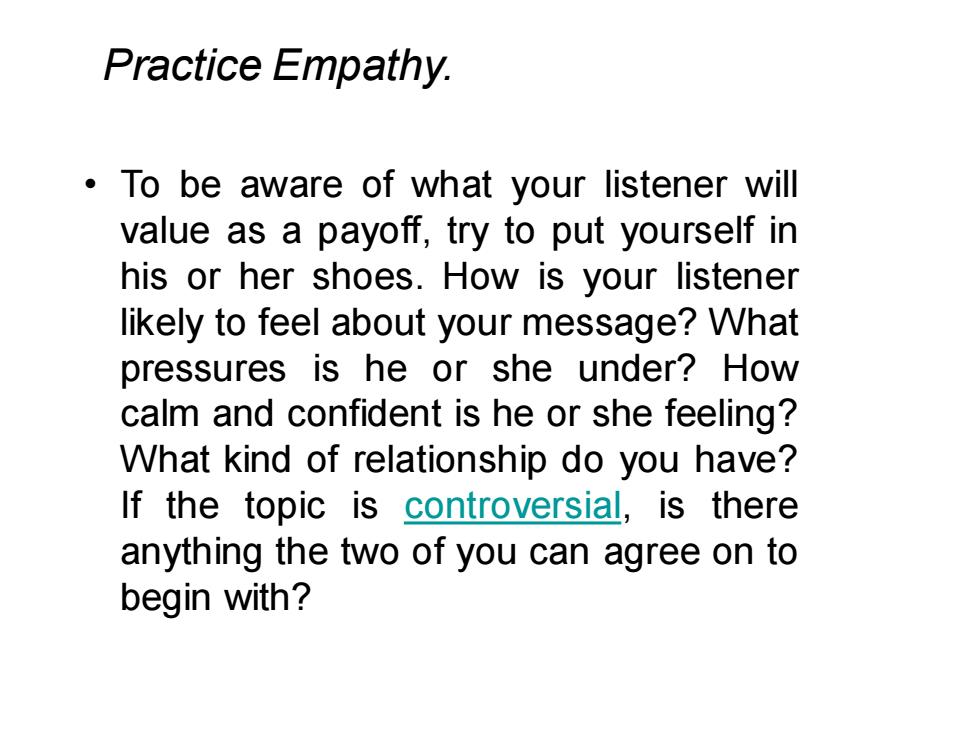
Practice Empathy. To be aware of what your listener will value as a payoff,try to put yourself in his or her shoes.How is your listener likely to feel about your message?What pressures is he or she under?How calm and confident is he or she feeling? What kind of relationship do you have? If the topic is controversial,is there anything the two of you can agree on to begin with?
Practice Empathy. • To be aware of what your listener will value as a payoff, try to put yourself in his or her shoes. How is your listener likely to feel about your message? What pressures is he or she under? How calm and confident is he or she feeling? What kind of relationship do you have? If the topic is controversial, is there anything the two of you can agree on to begin with?
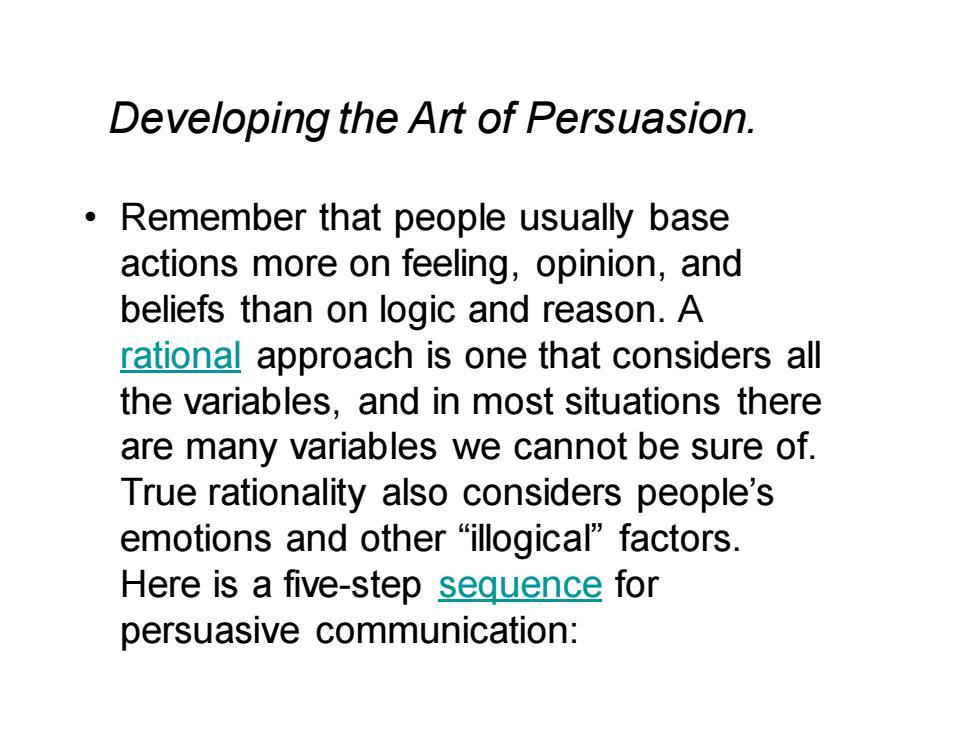
Developing the Art of Persuasion. Remember that people usually base actions more on feeling,opinion,and beliefs than on logic and reason.A rational approach is one that considers all the variables,and in most situations there are many variables we cannot be sure of. True rationality also considers people's emotions and other "illogical"factors. Here is a five-step sequence for persuasive communication:
Developing the Art of Persuasion. • Remember that people usually base actions more on feeling, opinion, and beliefs than on logic and reason. A rational approach is one that considers all the variables, and in most situations there are many variables we cannot be sure of. True rationality also considers people’s emotions and other “illogical” factors. Here is a five-step sequence for persuasive communication:
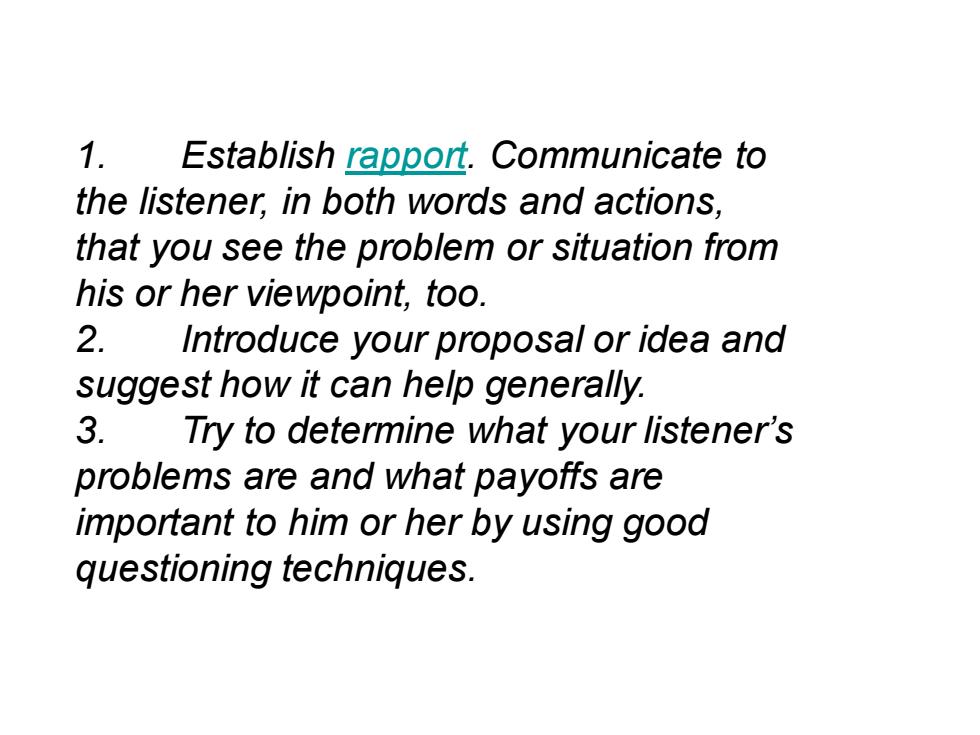
1. Establish rapport.Communicate to the listener,in both words and actions, that you see the problem or situation from his or her viewpoint,too. 2.Introduce your proposal or idea and suggest how it can help generally. 3.Try to determine what your listener's problems are and what payoffs are important to him or her by using good questioning techniques
1. Establish rapport. Communicate to the listener, in both words and actions, that you see the problem or situation from his or her viewpoint, too. 2. Introduce your proposal or idea and suggest how it can help generally. 3. Try to determine what your listener’s problems are and what payoffs are important to him or her by using good questioning techniques
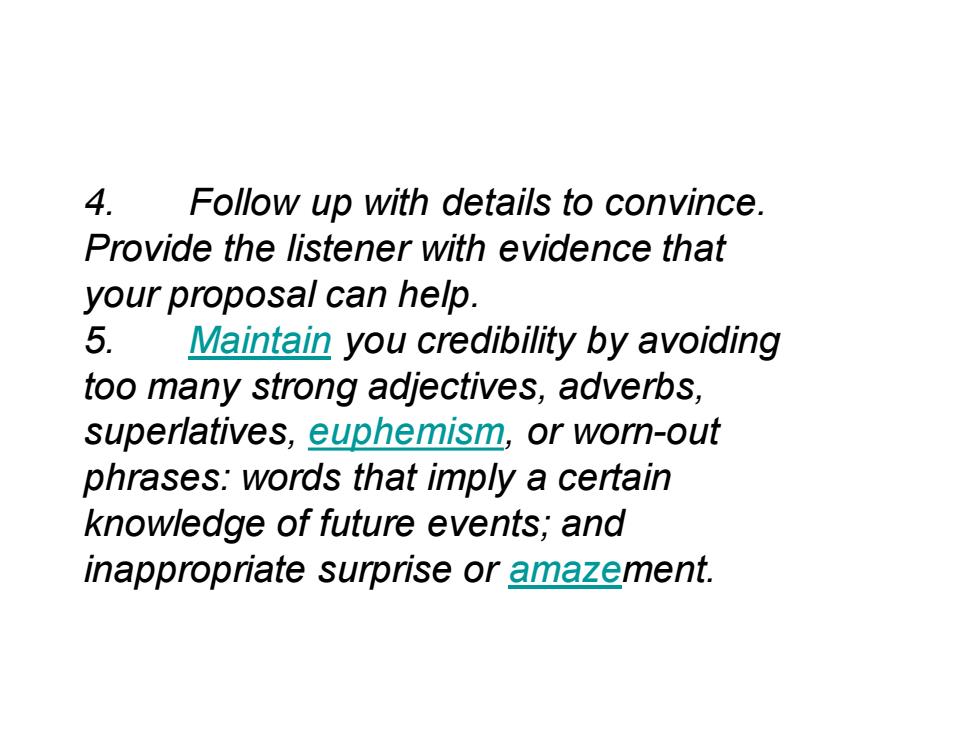
4. Follow up with details to convince. Provide the listener with evidence that your proposal can help. 5.Maintain you credibility by avoiding too many strong adjectives,adverbs, superlatives,euphemism,or worn-out phrases:words that imply a certain knowledge of future events;and inappropriate surprise or amazement
4. Follow up with details to convince. Provide the listener with evidence that your proposal can help. 5. Maintain you credibility by avoiding too many strong adjectives, adverbs, superlatives, euphemism, or worn-out phrases: words that imply a certain knowledge of future events; and inappropriate surprise or amazement
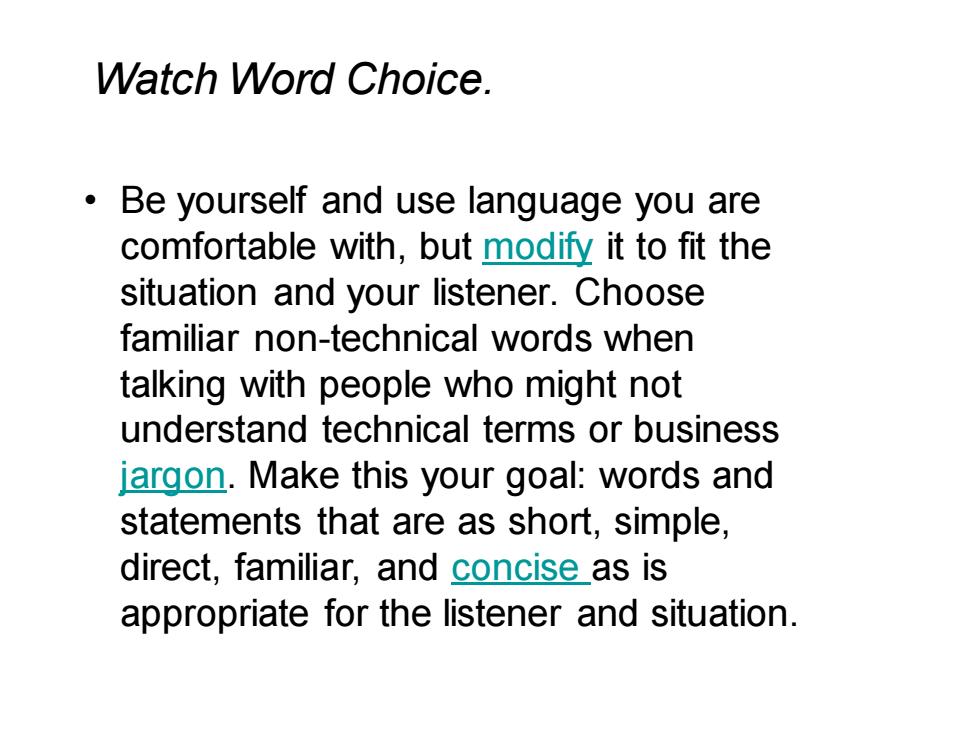
Watch Word Choice. Be yourself and use language you are comfortable with,but modify it to fit the situation and your listener.Choose familiar non-technical words when talking with people who might not understand technical terms or business jargon.Make this your goal:words and statements that are as short,simple, direct,familiar,and concise_as is appropriate for the listener and situation
Watch Word Choice. • Be yourself and use language you are comfortable with, but modify it to fit the situation and your listener. Choose familiar non-technical words when talking with people who might not understand technical terms or business jargon. Make this your goal: words and statements that are as short, simple, direct, familiar, and concise as is appropriate for the listener and situation
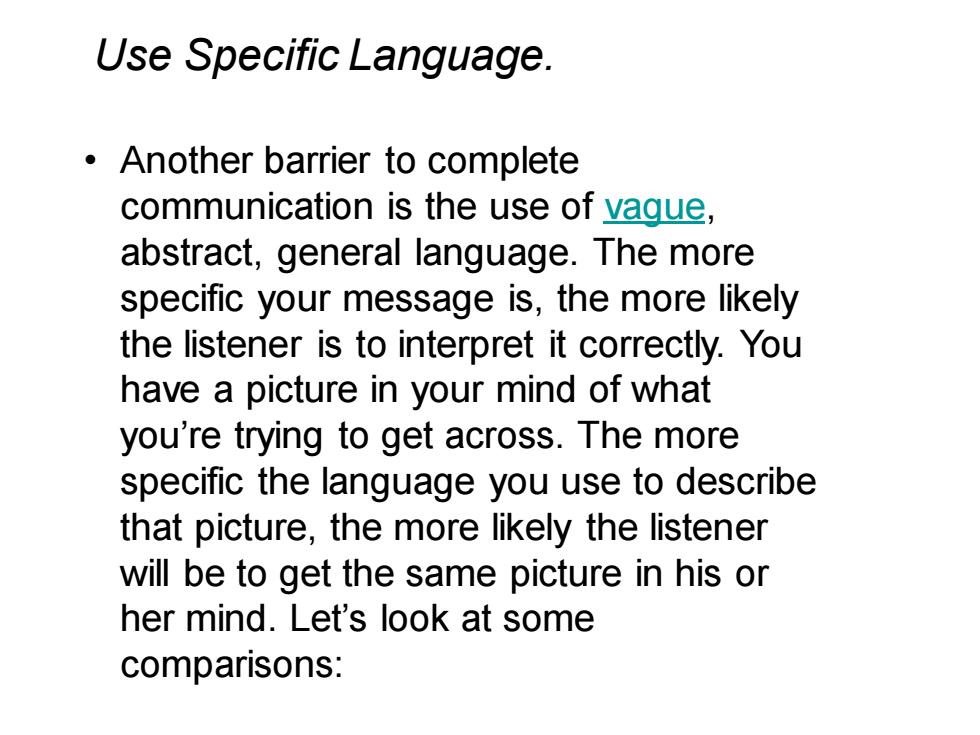
Use Specific Language. Another barrier to complete communication is the use of vaque abstract,general language.The more specific your message is,the more likely the listener is to interpret it correctly.You have a picture in your mind of what you're trying to get across.The more specific the language you use to describe that picture,the more likely the listener will be to get the same picture in his or her mind.Let's look at some comparisons:
Use Specific Language. • Another barrier to complete communication is the use of vague, abstract, general language. The more specific your message is, the more likely the listener is to interpret it correctly. You have a picture in your mind of what you’re trying to get across. The more specific the language you use to describe that picture, the more likely the listener will be to get the same picture in his or her mind. Let’s look at some comparisons: